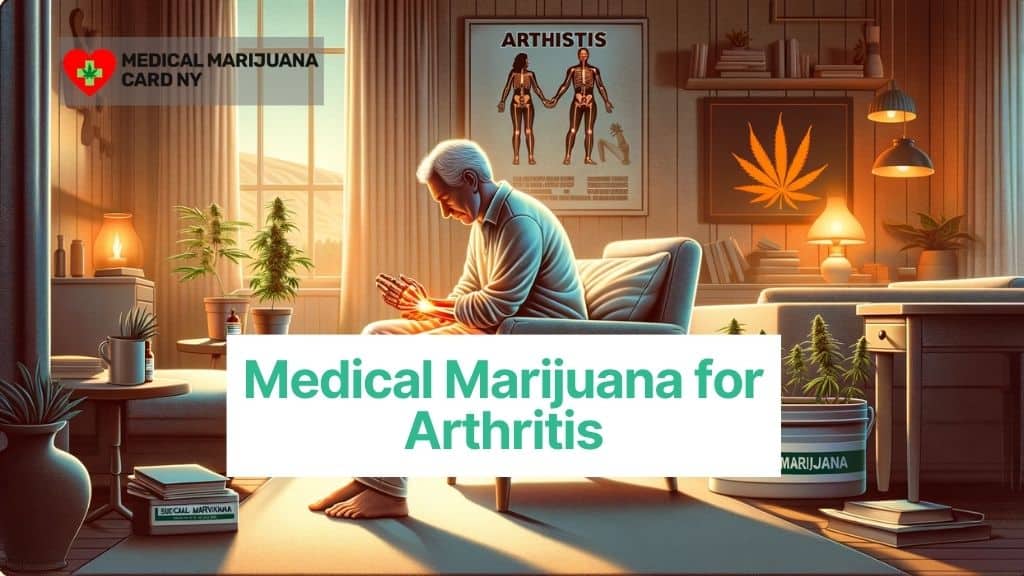Medical Marijuana for Arthritis Treatment has emerged as a pivotal solution for many grappling with the persistent pain and inflammation associated with arthritis. This comprehensive blog delves into the transformative role of medical marijuana in alleviating arthritis symptoms, offering a beacon of hope where traditional treatments may fall short.
We explore how the unique properties of medical marijuana interact with the body’s systems to mitigate pain and reduce inflammation, providing much-needed relief to those suffering from this debilitating condition. The blog also sheds light on the specific cannabinoids, like THC and CBD, which are instrumental in addressing arthritis symptoms, backed by scientific research and clinical studies.
As we navigate through the legal landscape of medical marijuana in New York, the blog becomes an essential guide for anyone considering this alternative treatment path. If you or a loved one are exploring options for arthritis treatment, this insightful and informative blog is a must-read, offering a new perspective on managing arthritis pain through the lens of medical marijuana.
Table of Contents
Toggle- Introduction to Medical Marijuana for Arthritis
- Medical Marijuana and Arthritis: An Overview
- Usage and Efficacy of Medical Marijuana for Arthritis
- Legal and Ethical Considerations in New York
- Patient Experiences and Case Studies
- Challenges and Considerations
- Medical Marijuana Recommendations in New York
- Conclusion
Introduction to Medical Marijuana for Arthritis
What is Medical Marijuana?
Medical marijuana, which is now legal in 38 states, refers to the use of the Cannabis plant as a physician-recommended therapy for certain conditions, including arthritis. Arthritis, a common cause of disability in the U.S., is characterized by symptoms such as joint swelling, pain, inflammation, and decreased motion range. Medical marijuana has been identified for its potential in treating these symptoms due to its anti-inflammatory and natural analgesic properties.
Why is Medical Marijuana Considered for Arthritis?
The consideration of medical marijuana for arthritis stems from its properties that can alleviate joint pain and inflammation. Despite the lack of extensive scientific research, due to factors like federal drug laws and lack of incentives for pharmaceutical companies, anecdotal evidence and some studies suggest its effectiveness in symptom relief. For instance, a 2006 study showed that a cannabis-based oral spray significantly improved pain and sleep quality in RA patients over a five-week period, without severe adverse effects.
Medical Marijuana and Arthritis: An Overview
How Does Medical Marijuana Help with Arthritis Symptoms?
Medical marijuana aids in arthritis symptom management mainly through pain relief and inflammation reduction. Cannabinoids, like THC and CBD, play a crucial role in this. They are known to decrease inflammation and pain in animal models. More than half of arthritis patients in a survey reported reducing pain medication use when using medicinal marijuana or cannabidiol (CBD).
What Are the Active Components in Medical Marijuana Affecting Arthritis?
THC and CBD are the primary cannabinoids in cannabis that are effective in decreasing inflammation and pain. THC is psychoactive and can make people high, while CBD acts on different neurological pathways, potentially having a calming or relaxing effect. These compounds interact with the body’s endocannabinoid system, influencing pain perception and inflammatory responses.
Usage and Efficacy of Medical Marijuana for Arthritis
How to Use Medical Marijuana for Arthritis?
Medical marijuana offers a variety of consumption methods for treating arthritis, each with its unique benefits. These include:
- Edibles: Edibles are food products infused with marijuana. They are a good option for those who wish to avoid inhaling smoke. The effects of edibles take longer to manifest but can be more prolonged.
- Oils: Cannabis oils can be consumed orally or used topically. Topical applications are particularly beneficial for localized joint pain in arthritis.
- Vaporizing: Vaporizing heats cannabis to a temperature where it releases its active ingredients without burning it. This method is less harmful to the lungs compared to smoking.
- Tinctures: These are concentrated forms of marijuana, often administered under the tongue. They provide a controlled dosage and fast-acting relief.
- Pills and Capsules: These offer a discreet and controlled dosage method, ideal for those who require consistent dosing and are uncomfortable with other forms of consumption.
What Research Supports the Use of Medical Marijuana for Arthritis?
While research on medical marijuana for arthritis is still evolving, some studies indicate its potential benefits. Key findings include:
- Pain and Inflammation Relief: Cannabis contains anti-inflammatory compounds and natural analgesics, which can help alleviate arthritis symptoms.
- Improved Sleep Quality: Patients with rheumatoid arthritis reported better sleep quality due to the pain-relieving effects of medical marijuana.
It’s important to note that high-quality, randomized, controlled trials are needed to further validate these findings and understand the long-term impacts of medical marijuana on arthritis.
Legal and Ethical Considerations in New York
Is Medical Marijuana Legal for Arthritis Treatment in New York?
As of 2023, medical marijuana is legally accessible in New York for various conditions, including arthritis. However, the legal landscape is complex and continually evolving. Patients no longer require a medical marijuana card but need a medical marijuana certification from a licensed physician. Upon receiving this certification, patients are automatically registered with the state and receive a registration ID number, allowing them to purchase medical marijuana products.
What are the Ethical Implications of Using Medical Marijuana for Arthritis?
The use of medical marijuana for arthritis raises several ethical considerations:
- Public Safety: Concerns about the psychoactive effects of THC, particularly in terms of driving or operating heavy machinery.
- Adolescent Use: The potential impact on developing brains, with recommendations against use by individuals under 25.
- Pregnancy: Advisories against the use of marijuana during pregnancy due to possible risks to the fetus.
- Substitution for Established Treatments: Ethical concerns arise when patients choose medical marijuana over established treatments, especially in the absence of comprehensive studies confirming its efficacy.
It’s essential for patients to discuss the use of medical marijuana with their healthcare providers to understand both the potential benefits and risks. Additionally, staying informed about the legal regulations in their state is crucial for compliant and safe use.
Patient Experiences and Case Studies
Who Has Benefited from Medical Marijuana for Arthritis in New York?
In New York, many individuals with arthritis have reported positive experiences using medical marijuana. These real-life cases and testimonials typically highlight significant improvements in managing pain and enhancing sleep quality. Patients often mention the relief they experience from chronic joint pain and the improved ability to engage in daily activities without severe discomfort.
Which Factors Influence the Effectiveness of Medical Marijuana in Treating Arthritis?
The effectiveness of medical marijuana in treating arthritis can vary based on several factors, including:
- Individual Differences: Each patient’s biology and the severity of their arthritis symptoms play a crucial role.
- Strains of Marijuana: Different strains of cannabis can produce varied effects, with some being more effective for pain relief or inflammation reduction.
- Dosages: Finding the correct dosage is essential for effectiveness and minimizing potential side effects.
Challenges and Considerations
What are the Challenges Faced by Arthritis Patients Using Medical Marijuana?
Patients using medical marijuana for arthritis face several challenges:
- Accessibility: Even with evolving laws, obtaining medical marijuana can be a complex process.
- Cost: The cost of medical marijuana can be a barrier for many patients.
- Stigma: There remains a societal stigma associated with using marijuana, even for medicinal purposes.
Can Medical Marijuana Replace Traditional Arthritis Treatments?
While medical marijuana offers benefits, it is not typically seen as a replacement for traditional arthritis treatments. It is often used in conjunction with conventional medications and therapies. Its role is primarily to manage symptoms rather than to address the underlying causes of arthritis. Patients are advised to consult healthcare professionals for a comprehensive treatment approach.
Medical Marijuana Recommendations in New York
How Can Patients Obtain a Medical Marijuana Recommendation in New York for Arthritis?
In New York State, patients can obtain medical marijuana recommendations for conditions like arthritis from certified healthcare providers. These providers must be authorized to prescribe controlled substances, be qualified to treat the patient’s specific condition, and have completed a training course on medical cannabis.
Once a healthcare provider certifies a patient for medical cannabis use, the patient is automatically registered with the Medical Cannabis Program. The MMJ certification includes a registry ID, which, along with a government-issued photo ID, allows the patient to purchase medical cannabis products from licensed dispensaries.
Where Can Patients Find Reliable Information on Medical Marijuana for Arthritis in New York?
Patients seeking reliable information on medical marijuana for arthritis in New York can find resources and guidance through the New York State Office of Cannabis Management. This official platform provides comprehensive information on the medical cannabis program, including details on qualifying conditions, finding a certifying healthcare provider, and locating medical cannabis dispensaries.
Conclusion
In conclusion, the landscape of medical marijuana in New York is evolving, offering new possibilities for arthritis patients seeking alternative treatments. With no need for a medical marijuana card, only a certification from a qualified healthcare provider, access has become more streamlined. Patients are encouraged to consult with certified healthcare professionals to understand the suitability of medical marijuana for their specific conditions and to obtain accurate and safe recommendations tailored to their needs. The New York State Office of Cannabis Management serves as a vital resource for up-to-date information and guidance on navigating this emerging therapeutic option.
Resource
https://pubmed.ncbi.nlm.nih.gov/35999581/
https://www.sciencedirect.com/science/article/abs/pii/S1297319X18300472





